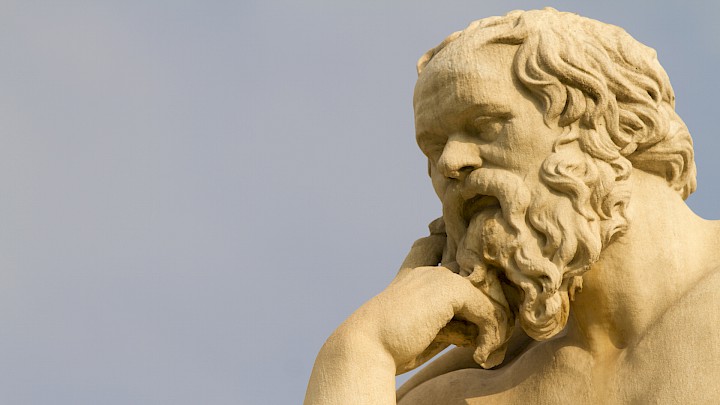
“It may justly be concluded that it is not easy for a man to know himself,” wrote Dr. Johnson, “for wheresoever we turn our view, we shall find almost all with whom we converse so nearly as to judge of their sentiments, indulging more favorable conceptions of their own virtue than they have been able to impress upon others, and congratulating themselves upon degrees of excellence.” The implication is that a man does not want to know himself, for if he did he’d be pained by the knowledge of what he is: selfish, dishonest, envious, hypocritical, delusional, and more. Instead he lies to himself, in essence.
“It is because they do not know themselves, more than any other reason, that so many people end up miserable. For in not knowing themselves, they do not know how to live.”
The mind, after all, is essentially functional. As thinkers from David Hume and Arthur Schopenhauer to William James and Richard Rorty have argued, the mind’s primary purpose is not to arrive at truth, but to enable us to pursue our ends, which are largely practical. We therefore believe many things not because they are true, but because they make us feel a certain way. And though truth is not determined by feeling, in one sense moral value is. It is true that the earth orbits sun, but the value of that natural fact, so central to human life, is affective, passional, an affair of the heart. Reflecting on the lived experience of value, James observed:
Our judgments concerning the worth of things, big or little, depend on the feelings the things arouse in us. Where we judge a thing to be precious in consequence of the idea we frame of it, this is only because the idea is itself associated already with a feeling. If we were radically feelingless, and if ideas were the only things our mind could entertain, we should lose all our likes and dislikes at a stroke, and be unable to point to any one situation or experience in life more valuable or significant than any other.
Then too, reason is weak compared to the imagination, which is not only more powerful than it, but comprehends our feelings besides. It is no wonder, then, that myth and allegory long preceded philosophy and science. And the mind functioning to aid survival and well-being, it is no wonder either that we spend a good deal of time in willful ignorance: getting on in life, our main activity, depends on believing some things rather than others, to which truth is often subordinated. As Joseph Conrad wrote in Victory, “every age is fed on illusions, lest men should renounce life early and the human race come to an end.” In fact, since illusions, lies, and errors are often most effective when it comes to advancing our largely selfish interests, it is merely fitting that throughout much of life we know neither ourselves nor others, while misperceiving and misrepresenting experience (often deliberately) to that end.
The tendency to a favorable but inaccurate self-conception, seemingly universal, is frequently accompanied by a tendency hardly less prevalent, whereby we attribute our problems to the flaws and failings of others. Because we conceive of ourselves as being more moral, more just, and, in a word, better than we really are, we naturally blame others—especially those in positions of power and authority—for life’s evils and injustices: not recognizing when misfortune is self-caused, or the instances in which we choose to do wrong not because of any external or structural influence, but simply for the sake of our own gain or gratification. Thus it is usually instructive to observe two people argue their respective “sides” during a dispute. In most cases, each person, whether consciously or no, will distort the actual events in order to suit his purposes. Neither will show much regard for objectivity or justice. In time, one notices that this is the normal course of things, so great, and greatly deceiving, is our self-love.
It is easy to be vexed by the extreme disparity of earnings between workers and CEOs, by the greed inherent in this and in our corrupt economic order generally. It is hard to do anything about that sort of thing, because it stems, ultimately, from the deeply self-interested character of human nature itself, which, once placed in certain circumstances, simply realizes its strongest inclinations. Thus reason deftly furnishes ad hoc justifications for what people want. The moral character of a thing may be only partially acknowledged, if at all, and it takes only moments for the mind to interpret behavior in a false but agreeable light. Nor will the memory necessarily impel one to confront the ignored truth. Said Nietzsche in a famous aphorism, “‘I did that,’ says my memory. ‘I could not have done that,’ says my pride, and remains inexorable. Eventually, the memory yields.” Indeed, truth, and honesty, matter so little to us that we are able to believe, or seem to ourselves and others to believe, conflicting ideas simultaneously. Lying seems much less of a paradox, or rather, not a paradox at all, once we realize that the mind does not always operate in a binary or consistent fashion, though usually in a self-interested (and frequently a delusional) one.
Modern comfort and ease obscure the most basic and vital truths. For example, that conflict is a necessary element of life, with the result that discord, both with ourselves and others, is not an exception but the norm in human affairs. “No man lives without jostling and being jostled,” said Thomas Carlyle; “in all ways he has to elbow himself through the world, giving and receiving offense.” Few people, indeed, consider what is prior to the corruptions in the social order that contains so much suffering and injustice; or in other words, where these ultimately come from. So it happens that many of us are able to believe political evils are simply structural, as if human nature itself were no obstacle. And yet, many a social critic would behave no better if put in the same circumstances as the powerful people about whom they are so indignant. Let the social critic be able to cut a lucrative illegal deal, give him some inside knowledge others don’t have, then see whether his indignation persists.
As we take the easy way out—simplifying things and blaming others—many of us nurse an inclination to personal grievance, to the cheapest sort of victimization. As the news shows every day, perpetual outrage—signifying perpetual self-absorption—characterizes our exceedingly sentimental time. Of course, it, too, is egotistical, and here we can see more of the usual perversity of human nature, that same perversity which makes things that begin in well-meant aims—religions, democracy, feminism—to soon enough take on a bad shape; sometimes turning out to be far worse than that which they set out to oppose. Our underlying egotism is so great, history suggests, that even growth in a good direction will often produce a kind of perverse offshoot, corrupting much, if not all, that was good in the original path. This suggests that we human beings are much less rational and reasonable than we tend to believe—to say nothing of how little just or constant we are.
Living in a society of cheap victimization, in which not we ourselves but others are to blame for everything, we overlook what bad inclinations exist in mankind as a whole. It is relentless, the criticism of those who rule over us. It is rarely recognized, though, that whatever evils they do, these reflect the very nature of the world we embody. Yet here the proper perspective is painful, and therefore difficult to accept, while conversely, it is comforting to believe things are better than they are, or can be much better. So it is that countless people are given to unrealistic expectations—sure sources of frustration, cynicism and bitterness—in the political domain. Many liberals, for example, believe that evil is nothing but misguided energy, the result of a wrong-headed course, bad conditioning having led to poor choices and unfortunate consequences. There was a lack of outlets or opportunities, and so on and so forth. But once everyone’s endowment is put in the right conditions, and guided in the right direction—a project for the state to engineer—evil will no longer exist. Then, everyone will be free, and enjoy the equality and happiness he deserves.
The error, and naiveté, lies in the assumption that guiding our endowment properly—or directing human nature, we might say—is simply a matter of implementing the right policies, of designing “society” in a certain manner, as if people were so much clay, as if evil were not always necessary to good and vice versa, or as if a world without evil were possible or even intelligible. Certainly, however, it is easy for people to make such a simplistic assumption; after all, in their understanding of politics as it is affected by human nature, they tend not to bear in mind their own history of moral failings. They rather overlook this, and assume politics consists of persons like themselves, “indulging more favorable conceptions of their own virtue than they have been able to impress upon others, and congratulating themselves upon degrees of excellence.” People, in short, are comfortably unaware of their deep inconsistency, of the contradiction between their rosy sense of themselves and their actual conduct in the world. So, when they contemplate politics, they are suddenly shocked by the very corruption which they could have perceived in themselves, had they not habitually employed the mind’s rationalization ability, which is inexhaustible, in order not to know themselves.
There are two more popular errors about evil. The first is that it results only when we fail to recognize the “humanity” of others. Ironically, in many instances it is precisely people’s humanity that causes others to want to harm them: believing they have been wronged in some way, angry persons seek revenge. The second is that evil results only from a “failure of communication,” the implication being that good communication would have prevented it. In fact, the world is full of exquisite communicators—writers, for example—whose special verbal facility does not make them any less likely to mistreat others. Nor is it true that incompatible values—a perpetual source of conflict all over the world—can be made otherwise through talk about “our common humanity” or skillful communication.
All history features evil and cruelty on every page, and yet there are many who insist on blaming the unhappiness of our condition on an external source. If, though, we were more willing to know ourselves, we should learn that within us virtue and vice are frequently commingled. So, my compassion for my sick mother is related to a resentment acting on the feeling induces in me. My goodwill for my newly promoted friend is bound up with envy. My generosity in picking up a check is not entirely sincere; there’s a feeling of reluctance in it, and behind that, perhaps, some greed. Sometimes an evil intention has a good consequence, and vice versa. Montaigne—so knowledgeable of himself, so honest with himself—long ago captured the dark complexity of our nature:
All the contraries are there to be found in one corner or another; after one fashion or another: bashful, insolent; chaste, lustful; prating, silent; laborious, delicate; ingenious, heavy; melancholic, pleasant; lying, true; knowing, ignorant; liberal, covetous, and prodigal: I find all this in myself, more or less, according as I turn myself about; and whoever will sift himself to the bottom, will find in himself, and even in his own judgment, this volubility and discordance. I have nothing to say of myself entirely, simply, and solidly without mixture and confusion.
The challenges we face in politics—with its inevitable disillusionments—correspond to the complexity of human character, from which it follows that things often are not as they seem. But the more we know about ourselves and other people, the more reasonable shall our expectations be in politics and indeed all other domains. And so long as we are disciplined enough to apply the fruits of self-examination, the better we shall live. It is because they do not know themselves, more than any other reason, that so many people end up miserable. For in not knowing themselves, they do not know how to live.
George Orwell noticed that the person who deplores anti-Semitism generally “fails to start his investigation in the one place where he could get some hold of reliable evidence—that is, his own mind.” So it is with the ordinary social critic. He is forever criticizing the next fellow and the social structure, overlooking the reality that it is ultimately the flaws of human beings in general that are behind our gravest problems, and which, if he is honest, he can find in himself. Although corruption is most obvious in politics, since there it receives the most attention, it should be assumed that some amount of corruption is everywhere, albeit usually unnoticed, since human beings are adept at concealing it, and since, again, we typically don’t want to notice it either.
To understand the complete truth about human institutions, liken them to the family, because each contains corruption, not to be revealed to outsiders, as the popular saying “the family dirty laundry” attests. It is true, as many maintain, that social structures tend to be corrupting. But they are never separate from the primary thing, human nature itself, although they always reflect it. Nor should anyone approach reform without keeping in mind that not just social structures but our nature itself has a way of undermining progress. Once you grasp that bracing reality, you may ask yourself whether the reform is really worth undertaking. “Given what people are like, what is reasonable to expect from them and this endeavor?” That is the necessary question.
We should expect all forms of wickedness, corruption, lies, betrayal, treachery, and more. Then, rather than getting exceedingly indignant about such injustice, wasting time with vain words, we should approach it with a fighting spirit, an opposition more of lofty will than of abstract intellect.
When stiff and sore and scarred
I take away my hand
From leaning on it hard
In grass and sand,
The hurt is not enough:
I long for weight and strength
To feel the earth as rough
To all my length.
—Frost
But we must first understand things with as much disinterestedness and nuance as possible. Too often hard issues are simplified, so that criticism and solutions are worth very little. To understand the truth about human motives is also to understand just how limited and temporary social progress and reform must be. For the final truth is that in politics we receive a reflection of the evil we already are. In this context our disenchantment is an hypocrisy by which we obscure the primary one, ourselves.
Said Dr. Johnson:
To lay open all the sources from which errour flows in upon him who contemplates his own character, would require more exact knowledge of the human heart, than, perhaps, the most acute and laborious observers have acquired. And since falsehood may be diversified without end, it is not unlikely that every man admits an imposture in some respect peculiar to himself, as his views have been accidentally directed, or his ideas particularly combined.
We are deep in delusion, each in his own particular way, nor can we fathom all the sources. Still, here is the starting point for a progress beyond laws and policies. What we need to do is to take an unflinching look at how our nature itself creates our problems—how we are own problem—instead of going the easy way and only blaming social structures, “power,” government, and the like. This alone is the way to manly self-reliance, which is certainly preferable to our time’s constant victimhood. Being prone to self-deception, we must take extra care about our conduct. This should lead to having a deeper understanding of the complexity of our characters, those marvels of intricacy. The wise person is marked by greater self-knowledge than others, but also greater perplexity with himself; for, consistently contemplating his life, his own person becomes a source of endlessly puzzling inquiry. The moral will, he learns above all, is more vital than the mind, which must be answerable to the self’s honesty and discipline. Exacting self-examination should promote more realistic expectations in politics and life generally. If we are more honest with ourselves, we may understand that we are not trying to change the world but rather, ourselves. “This world is good enough for me,” said William Empson, “if only I can be good enough for it.”

